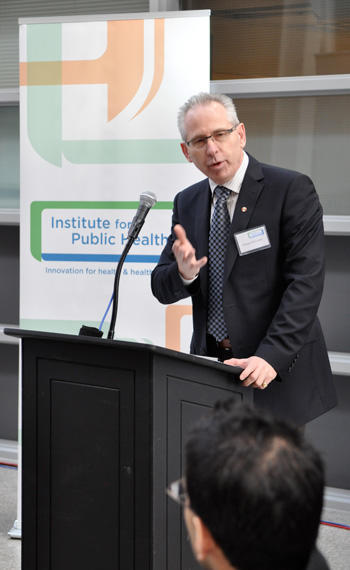Dec. 7, 2011
New name for research group

Ed McCauley, vice-president (research) says the institute will make an important contribution.
Bruce Perrault
The Institute for Public Health has a new look, and a shorter name. Evolving from the Calgary Institute for Population and Public Health, the Institute for Public Health will build upon its research strengths in health services, population health, and public health.
The Institute has more than 260 members, combining their research and knowledge to collaborate on new ideas and projects. Half are from the host Faculty of Medicine and a dozen or so other members come from faculties including nursing, social work, arts, kinesiology and veterinary medicine. Another 90 members are from Alberta Health Services, and about 30 are from other municipal and provincial agencies and institutions.
“Momentum has been building for the Institute over the last year and a half, as we’ve come to understand our diverse membership and defined our research groups and themes,” says Dr. Bill Ghali, scientific director of the Institute for Public Health. “We’re so excited about our potential.”
Ed McCauley, vice-president (research), acknowledged the important contribution the institute will make toward the university becoming one of Canada’s top five research intensive universities by 2016.
“Part of the university’s new Eyes High strategic direction is to fully engage the communities it both serves and leads,” says McCauley. “The Institute for Public Health is a leader in community engagement through its strong linkages with Alberta Health Services, its expertise in knowledge translation, and its dedication to conducting research in partnership with health systems and public health stakeholders.”
The institute celebrated the launch of its new name and look Dec. 2 during a members’ forum entitled “Elevating our Science,” at which the Canadian Institutes for Health Research’s Robyn Tamblyn discussed opportunities emerging from CIHR’s Institute for Health Services and Policy Research.
“Canada’s health system was for years a model for other countries, but in measures of timeliness, appropriateness, equity, and efficacy, we have fallen behind many other countries” Tamblyn says. “Major changes are needed, and research is the place to start for evidence-based innovation.”
Tamblyn, the scientific director of the Clinical and Health Informatics Research Group at McGill University, spoke later in the day about the use of e-health technologies to support integrated care for chronic disease at the Mamoru (Mo) Watanabe Lectureship.
